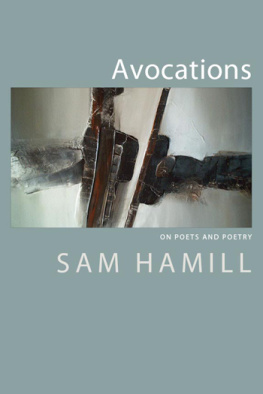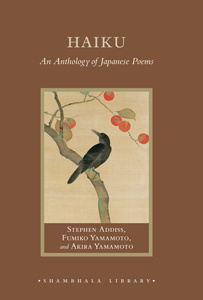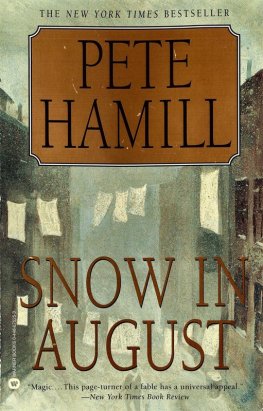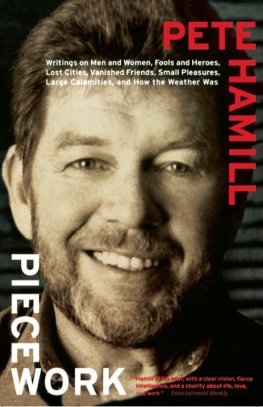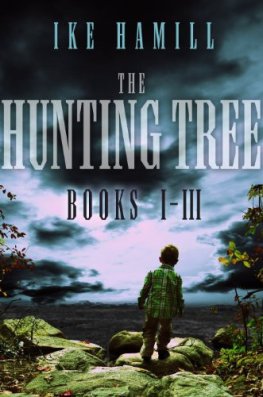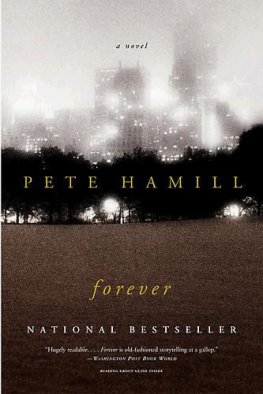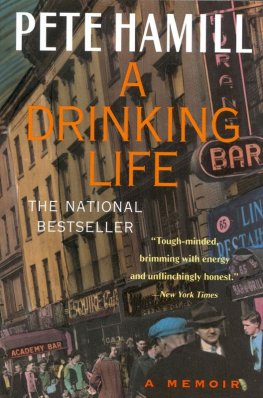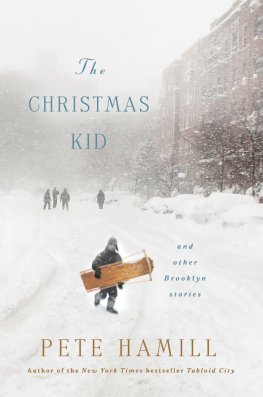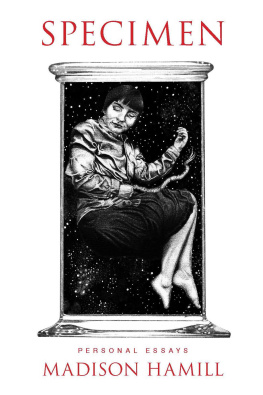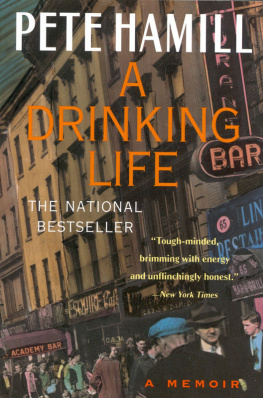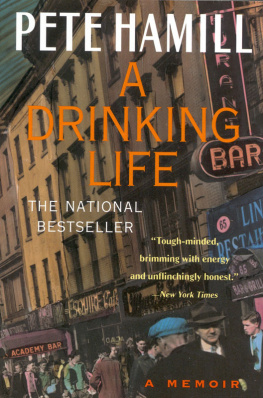SAM HAMILL - AVOCATIONS
Here you can read online SAM HAMILL - AVOCATIONS full text of the book (entire story) in english for free. Download pdf and epub, get meaning, cover and reviews about this ebook. year: 2017, publisher: Red Hen Press, genre: Science. Description of the work, (preface) as well as reviews are available. Best literature library LitArk.com created for fans of good reading and offers a wide selection of genres:
Romance novel
Science fiction
Adventure
Detective
Science
History
Home and family
Prose
Art
Politics
Computer
Non-fiction
Religion
Business
Children
Humor
Choose a favorite category and find really read worthwhile books. Enjoy immersion in the world of imagination, feel the emotions of the characters or learn something new for yourself, make an fascinating discovery.
- Book:AVOCATIONS
- Author:
- Publisher:Red Hen Press
- Genre:
- Year:2017
- Rating:4 / 5
- Favourites:Add to favourites
- Your mark:
- 80
- 1
- 2
- 3
- 4
- 5
AVOCATIONS: summary, description and annotation
We offer to read an annotation, description, summary or preface (depends on what the author of the book "AVOCATIONS" wrote himself). If you haven't found the necessary information about the book — write in the comments, we will try to find it.
AVOCATIONS — read online for free the complete book (whole text) full work
Below is the text of the book, divided by pages. System saving the place of the last page read, allows you to conveniently read the book "AVOCATIONS" online for free, without having to search again every time where you left off. Put a bookmark, and you can go to the page where you finished reading at any time.
Font size:
Interval:
Bookmark:
Annotation
Avocations collects the best of Sam Hamill's prose on poetry over the last 18 years, presenting insightful readings of Kenneth Rexroth, Denise Levertov, Odysseas Elytis, Matsuo Basho, Kobayashi Issa, John Logan and many others together with critical commentary on poetry in translation and the practice of poetry in general.
Avocations
Avocations
On Poets and Poetry
Sam Hamill
 RED HEN PRESS | Los Angeles, California
RED HEN PRESS | Los Angeles, California
Avocations: On Poets and Poetry
Copyright 2007 by Sam Hamill
All rights reserved
No part of this book may be used or reproduced in any manner whatsoever without the prior written permission of both the publisher and the copyright owner.
Book design by Mark E. Cull
Cover picture: Strong Enough ,
artwork by Rom LAMMAR from Luxembourg.
ISBN-10: 1-59709-086-7
ISBN-13: 978-1-59709-086-5
Library of Congress Catalog Card Number: 2006936790
Earlier versions of these essays and reviews appeared in Academy of American Poets , American Poetry Review , The Georgia Review , Mid-American Review , Onthebus , Poetry East , Seneca Review , Complete Poems of Kenneth Rexroth (Copper Canyon Press, 2004), Haiku: This Other World (Arcade Publishing, 1998), Narrow Road to the Interior & Other Writings (Shambala, 2000), Spring of My Life & Selected Haiku (Shambala, 1997), Toward the Distant Islands: New & Selected Poems of Hayden Carruth (Copper Canyon Press, 2006)
The City of Los Angeles Department of Cultural Affairs,
Los Angeles County Arts Commission
and the National Endowment for the Arts
partially support Red Hen Press.
Published by Red Hen Press
First Edition
To Gray Foster & Eron Hamill
And to Esteban Moore, Paul Nelson and Courtney Hudak
Love the earth and sun and the animals, despise riches, give alms to everyone that asks, stand up for the stupid and crazy, devote your income and labor to others, hate tyrants, argue not concerning God, have patience and indulgence toward the people, take off your hat to nothing known or unknown, or to any man or number of mengo freely with powerful uneducated persons, and with the young, and with the mothers or familiesre-examine all you have been told in school or church or in any book, and dismiss whatever insults your own soul; and your very flesh shall be a great poem, and have the richest fluency, not only in its words, but in the silent lines of its lips and face, and between the lashes of your eyes, and in every motion and joint of your body.
Walt Whitman,
Preface to 1855 edition, Leaves of Grass
out of key with his time
He strove to resuscitate the dead art
Of poetry; to maintain the sublime
In the old sense.
Ezra Pound,
Hugh Selwyn Mauberly
Preface
These essays, introductions and reviews were written mostly in the 1990s, the earliest dating from the first War on Iraq in 1991, and are an extension of the work begun with A Poets Work (Carnegie-Mellon University Press), published in 1988.
Four decades of assaying poetry and its fundamental traditions and practices have shaped my life. Because I believe that poetry can be a path to enlightenment, from my daily Zen practice and daily engagement with poetry, an ethos and an aesthetic emerge. They are not two things, but onethe expression of practice, of being. But I have never believed that poetry is the path to enlightenment, Buddhist or otherwise. If my engagement with poetry has been thoroughstudy, writing, editing, translating, printing, publishing, teaching, critical writing, advocacythat has not been a circumstance of accident. I sought; I seek; I practice.
Poetry, my old friend Hayden Carruth likes to say, is nothing special; its ordinary, like music. Any respectable bricklayer understands that real bricklaying is a path to enlightenment. The grandfather of Zen, Hui Neng, was an illiterate woodcutter who tore up the sutras. Every musician, every bricklayer, knows the importance of practice.
My vows to poetry are almost religious vows. This is the path I will follow to the end. It is a path, not a destination, an avocation much more than a vocation.
Years ago in Japan, I heard a story about a brilliant young shakuhachi student who wanted to learn at the feet of a great old master. Granted an interview with the Master, he was told, Play C, and the student blew a resonant C. The Master said, Pretty good. You work hard on that and come back next year. There are many pretty good poets in the world, but mastery is something else. And there are many, many poetry bodhisattvas.
I have always believed that poetry is a very large house. I have never believed that it was my fate or right to become Keeper of the Keys to that mansion. No one holds all the keys. Plenty of room for Beethoven and Lady Day; plenty of room for John Coltrane and John Prine; for Hank and for Bird. Every door requires a key. Every door is an opening and a closure. The view from every window and balcony is unique.
And yet nothing is self-originating, neither poetry nor democracy, neither self nor other. We have roots and grow branches. I remain a novice, a servant with many masters. I know in which room I sleep and dream, and I know at whose table I eat. I know what road brought me even as I realize, as Takamura Ktar wrote, No road leads the way; the road follows behind.
Poetry, like Buddhist practice, has no fixed religious belief, and yet, like Buddhist practice, it approaches religious empiricism in its thusness. Kenneth Rexroth wrote, True illumination is habitude. We are unware that we live in the light of lights because it casts no shadow. When we become aware of it we know it as birds know air and fish know water. For Rexroth, the poem was a sacramental act arising naturally from the rich interior life interacting with the exterior world.
Begun as we began bombing the Middle East, these articles of avocation go to press as we remain at war in the Middle East fifteen years later. While I have grown increasingly pessimistic about the government of our United States, I have grown increasingly convinced that poetry is an essential part of the solution. Since founding Poets Against War in 2003, I have traveled the world and met hundreds of poets and find that we are almost universal in agreement that violence is not a solution to anything and that poetry is a path to enlightenment.
When my fellow poets claim, as Mark Strand wrote in a review of Pablo Nerudas poetry, Political poetry has no legs, or when I am asked, Why cant you just leave the politics out of it? by obviously illiterate media personalities, I want to scream. Our poetry American poetry grew out of Walt Whitman and Emily Dickinson, Ezra Pound and William Carlos Williams, Muriel Rukeyser and Langston Hughes. Our earlier poets and our traditionalists are a branch of Romanticism, and one neednt read deeply to discover the devout revolutionary tradition in Keats or Shelley.
There is no major poetic tradition in the world that is apolitical. Even the Buddhist nature poetry of Asia carries various arguments or affirmations of this or that sect, and often rejects the world of red dust in favor of the world of dew. Its almost impossible to write an apolitical poem. Ones politics, Su Tung-po declares, should arise naturallylike mushrooms growing from manure.
Pound writes, More poets fail from lack of character than from lack of talent. Albert Camus drew a very clear line between those who accept the consequences of being murderers themselves or the accomplices of murderers, and those who refuse to do so with all their force and being.
There are presently more than thirteen thousand members of Poets Against War.
Poetsall conscious peoplechoose the conditions by which their lives are conducted. Some are seduced by the materialist monoculture; some revolt and become revolutionaries; most live somewhere between the extremes. And, sadly, many simply live unconscious lives, lives without avocations, without imagination, with little passion and little love, lives without poetry.
Next pageFont size:
Interval:
Bookmark:
Similar books «AVOCATIONS»
Look at similar books to AVOCATIONS. We have selected literature similar in name and meaning in the hope of providing readers with more options to find new, interesting, not yet read works.
Discussion, reviews of the book AVOCATIONS and just readers' own opinions. Leave your comments, write what you think about the work, its meaning or the main characters. Specify what exactly you liked and what you didn't like, and why you think so.

